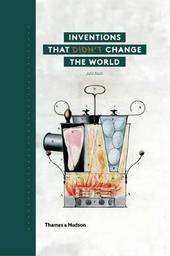
|
Inventions that Didn't Change the World
Hardback
Main Details
| Title |
Inventions that Didn't Change the World
|
| Authors and Contributors |
By (author) Julie Halls
|
| Physical Properties |
| Format:Hardback | | Pages:224 | | Dimensions(mm): Height 240,Width 170 |
|
| Category/Genre | Industrial / commercial art and design
Inventions and inventors |
|---|
| ISBN/Barcode |
9780500517628
|
| Classifications | Dewey:608.7 |
|---|
| Audience | |
|---|
| Illustrations |
240 Illustrations, color
|
|
Publishing Details |
| Publisher |
Thames & Hudson Ltd
|
| Imprint |
Thames & Hudson Ltd
|
| Publication Date |
6 October 2014 |
| Publication Country |
United Kingdom
|
Description
Welcome to the world of Victorian product design, and the improbable inventions that never quite made it into production during Britain's period as the workshop of the world. These genuine domestic and professional designs, registered in the 19th century for the most unlikely innovations, have been boxed away - until now - deep in the vaults of The National Archives. Meticulous illustrations and descriptions accompany the boldest of claims for making daily life in a newly industrialized world that little bit easier. These truly are design solutions to the problems you never knew you had.
Author Biography
Julie Halls is a curator and specialist in 19th-century registered designs at the National Archives.
Reviews'A treasure trove of self-ventilating hats, boot warmers, hair-brushing machines and improved pickle forks ... a unique insight into the world that spawned them' - Guardian 'Patently daft ... wonderfully wacky ... bonkers' - Daily Mirror 'Hundreds of bizarre nineteenth-century designs ... all laid out with skilful draughtsmanship and Heath Robinson-style eccentricity' - New Statesman (Picture Book of the Week) 'Inventors, however mad, must get things wrong if they are to get things right: a thousand Wallace and Gromits for every Brunel or James Dyson is a price worth paying' - Daily Telegraph 'Irresistible ... these inventions provide entertaining glimpses of the lives, hopes and fears of our nineteenth-century forebears' - The Lancet
|